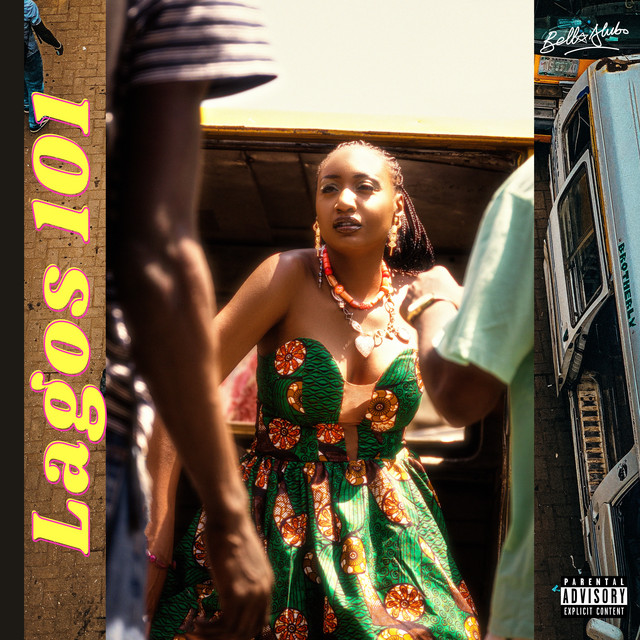
Get your tickets here for a day of fun, networking and partayyyyy.
[ad]
wordpress-seo domain was triggered too early. This is usually an indicator for some code in the plugin or theme running too early. Translations should be loaded at the init action or later. Please see Debugging in WordPress for more information. (This message was added in version 6.7.0.) in /home/bcm/src/dev/www/wp-includes/functions.php on line 6121

[ad]

Growing up in a Christian Nigerian home in the 90s to early 2000s meant you listened to certain gospel songs over and over again. We all sang along to these tunes during weekend chores, and danced choreographies to them in church or at end of the year parties.
Panam Percy Paul released Bring Down the Glory 2 (God of War) in 1989, and its first song, Come, Let’s Praise the Lord, instantly became the go-to for choreography presentations in schools and churches. Once upon a time, at this time of the year, kids across Nigeria would be rehearsing their synchronised moves to the gospel worship song.
Akanchawa is an Igbo gospel song that was popular across households in the South-East and Lagos. The title means “The hands that bring good things”, a reference to God’s hands. Akanchawa is the first track on Princess Njideka Okeke’s Ministration Worship Part 1 album. Almost every Nigerian mum had the audio CD and played it on Saturday mornings.
The Cherubim and Seraphim Movement Church choir, Surulere, Lagos, released their Oke Mimo album in 1991. Apata Ayeraye which means “rock of ages” in Yoruba, was a standout hit for most families throughout the 90s. The worship song interpolates from the popular Yorùbá hymn of the same name.
Every Sunday morning before rice and stew, this song was the tonic. If you grew up in a Christian Yorùbá home in the early 2000s, there’s no way you escaped this song. The titular track on Dunni Olanrewaju’s Opelope Anointing (2000) became a pop statement for gratitude and escaping adversity. The filling station closed immediately after they sold me fuel? Opelope anointing.
In 2003, Amaka Okwuoha released her hit song, Chioma Jesus, under New Jerusalem Music. She performed the song in Igbo with her iconic high-pitched vocals backed with heavy keyboard and drums. Chioma Jesus became such a hit that the singer is still referred to as “Chioma Jesus” today.
In 2008 and 2009, you couldn’t travel from Lagos to the South-East for Christmas and back without hearing this jam. It was a favourite for bus drivers and Igbo mothers alike. Oga Eme is fast-tempo and full of traditional Igbo music elements.
Baba Mimo Mowa Sope (2001) is one of Tope Alabi’s classics and most diverse records. The praise song has a Makossa sound that sampled Magic System’s 1er Gaou (1999). It wasn’t just a turn-up jam in Christian circles, it was the ultimate birthday party favourite. Back then, the best dancer to this song always got sweet and biscuit. What a period.
The year was 2008 when a music quartet called Midnight Crew stormed the country with Igwe, their multi-lingual gospel hit. It was recognisable instantly from its beat drop — the perfect ringtone material. If Midnight Crew, made up of Patricia Uwaje-King, Odunayo Ojo-Onasanya, Mike Abdul and Gbenga Oyebola, put this out today, it’d be a TikTok bop.
Infinity arrived in the era when Nigerian Gospel music was experimenting with diverse genres to bridge creativity with spirituality. Although Olori Oko came out in 2006, it’s an evergreen gospel bop today.
Lara George’s 2008 debut album, Forever In My Heart, gave us the hit single, Ijoba Orun, which has since become the Nigerian church’s call-to-action for those seeking to become “born again”. Ijoba Orun is a mellow and soulful cut, and Lara did absolute justice to it with her skilled vocals.
As a kid, Opomulero (2009) by Angel signalled gospel music’s complete shift from the stereotype to elements of secular pop instrumentals and delivery. Opomulero didn’t just eat as a party jam, it was the go-to for choreography presentations across Nigerian primary and secondary schools.
“Joy, joy, joy in my heart is ringing” was on the lips of every kid when it came out in 2008. The Iwueze siblings (Favour, Rejoice, Joshua, Best and Caleb) had everywhere in a chokehold when they debuted with Joy Joy Joy, the first volume of their gospel music installations.

It’s easy for albums to easily get lost in the pile of the singles 2023 has been choked with. So we went digging into the Nigerian music released so far to discover and rediscover the bodies of work women have blessed us with this year.
On KOLLIDE, Kold AF’s vocabulary oozes of admirable bluntness and confidence. They hold stead and still leave one open enough to admit that “I’m a hard guy, but I hurt sometimes too.” The EP offers six songs that explore romance, being broke and keeping heart on the sleeve.
Kold AF is an amazing singer and overall, KOLLIDE is clear afropop and r&b fusion. With a platform like Aristokrats Records (Burna Boy, LeriQ, Mojeed, Novemba) behind her, it’s only up. We’re rooting for her.
TY Bello invited other artists she loves together on Heaven Has Come. Listening to the album comes with a feeling that suggests that it’s more than just an album of MP3s and WAV. files — it’s transcendental experiences of worship and praise. The production is excellent, catchy and modern, but won’t make you lose your home training and start throwing legwork anyhow.
Christtie as Jay is an innate storyteller and spoken word artist. Her newly-released EP, Grey Choir, beautifully blends spoken word and music,explores self-love, sexuality, relationships, melancholy, grief, and japa themes.
The sonic palette of the project is just as broad as the array of emotions and topics she explores. On Story Story, guest artist Mo’Believe’s book builds a commentary around Lagos-living.One could almost hear Christtie Jay burst into tears on Hello/Goodbye, the track before the last. Poetry-music projects require attentiveness, including Grey Choir.But you never know what the next track will sound like. Every song is unique and captivating.
Rukmani’s EPis Pop-inflected R&B at its finest. Angel On The Run opens with guitar strings that usher in Rukmani. From the first track, Purpose, a song about reconciling past mistakes, to the seventh track, Softies Vibes, a vulnerable expression of self-love, Rukmani’s silky voice keeps calling to her listener.
Angel On The Run is the music to get cosy to, especially when emotional waves crash over you.
On her self-titled debut music project, Winny, a Nigerian reggae artist, turns her love tales and heartaches into songs. Winny’s voice can quickly become a rude gyal’s weapon, full-blasting in patois. At the same speed, she can be very soft and begs a lover not to leave. WINNY is an exciting body of work; the seven tracks promises that the Nigerian music scene will soon become very fluid and accessible to all styles and genre
Beyond being a super producer and sound engineer, Bloody Civilian isn’t your average artist. Check her collaborative effort with Native Records and Marvel’s Black Panther. Even her name. Then check her Anger Management EP. But don’t stop there — dive into the music project and enjoy her brilliant brand of storytelling that’s rare in our popular music scene. Parental supervision, poke-nosing family members, and anti-misogyny are some of the stories Bloody Civilian lays bare in the project. If you’re not jamming to this for enjoyment, don’t forget it anytime you fume angry.
In Nigeria, where niché music isn’t as widely accepted, Lindsey Abudei continues to polish her brand of Neo-soul, alternative R&B. Her new project, Kaleidoscope, is recent proof.
The music on Kaleidoscope is cinematic. Asides from her lyricism, the drums are softly tapping, guitar strings jumping and giving Jazz vibes. On days that emotions are high and running, or there’s just stillness — Lindsey’s got us.
Also, film production companies and theatres need to holla at her and cut her cheques for movie soundtracks ASAP.
In five songs, RnB Princess lifts the things that usually stay in a diary to the recording studio,spilling her heart out about unreturned love, jilt and the relationship woes that trouble a Gen-Z lady. The EP features new R&B babes Tsuni and Keziah Mallam — one can liken their collaboration to a girl’s night out, in group support of a heartbroken friend that shouldn’t be left by her pain or loneliness. Nothing is actually hotter than women supporting women.
In just six tracks, Mercy Chinwo performs worship songs that’ll put you in thanksgiving mode and waving your hands in the air. But these are not only church songs; they are personal testimonies and declarations many Gospel or Christian music lovers will passionately sing along to. The instrumentals are vibrant, exciting and comforting — she beautifully sings of her belief and spirituality.
Mercy Chinwo isn’t one of Africa’s most prominent gospel artists for nothing.
At a time we can count Nigerian female mainstream rappers on one palm, Lifesize Teddy shows up as Mavin’s last signee with her titular EP. She raps and sings well in English and Pidgin English. The PH dialects you hear in her lines are pointers to her home-base, City of Garden. Get in tune with Teddy.
After a four-year album break, Lady Donli’s sophomore album, Pan African Rockstar comes out and gets on our rotation,blasting funk, percussion and electric guitars.
Many considered her first album Enjoy Your Life a classic, and her latest has materials and the making of a classic, too. We’ll give it some time, but this is an album we won’t stop jamming for a while.
She’s a singer who does afropop and other sounds like Amapiano and R&B. Her EP combines these sounds with her girly side and street consciousness. When not moulding Arya Starr and Fave on King Kong, she’s a neo-Fuji star like Asake on Iyele or a blue c-note, worried and gloomy, on Holy Days.
Although Bella Alubo came from Jos, she’s handing us a guide to navigate Lagos.
The growth of Bella Alubo has been interesting to see. She went from being a straight-up rapper to becoming an all-around artist. Lagos 101 is a commendable effort. It may be the direction she feels is next for her career, but we still struggle to connect to the music.
In Lagos 101, she’s singing about having fun and not rushing into love. Even though we found some details about the widespread belief that finding love in Lagos might be the hardest; either you’re the hunter or end up the target.

Grace Idowu is a gospel artist with a commanding voice. One vocal cord moves, and it grabs your attention.
More, her second body of work, is a choir-backed seven-track that focuses on eulogising God, strengthening her relationship with the spiritual being and speaking positively into existence. The beats are very hard, but Grace Idowu even goes harder with her rap verse on Joy, our favourite track on the EP. GIf there are love songs to God, this is what they sound like.
Listen to them: